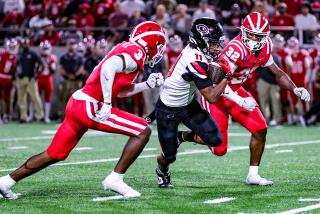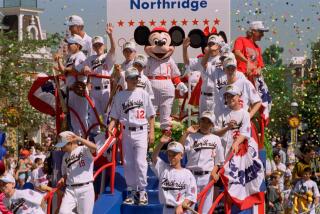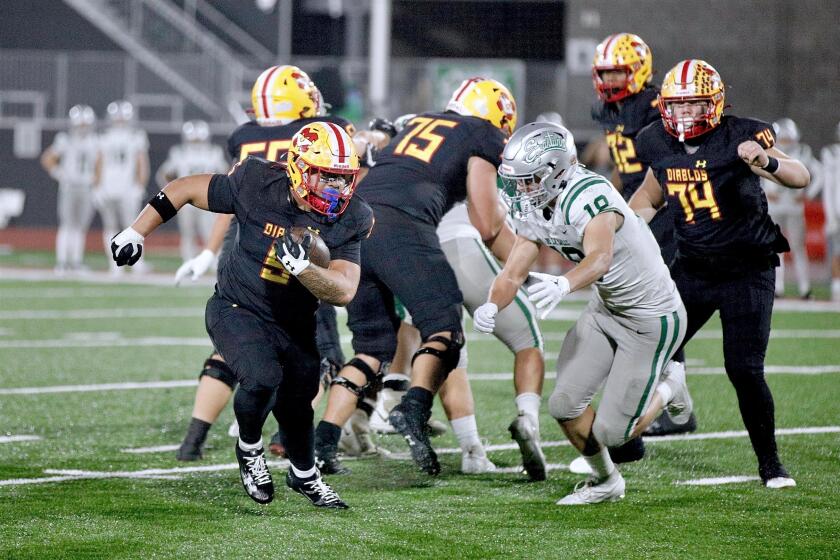Transfer of Power : Small Came From Washington State to Hit 18 Home Runs for Northridge
For a guy who claims not to be trying to hit home runs, Andy Small has a remarkable sense of timing.
On each of the three occasions in which student-trainer Darren Johnson has asked Small to hit a home run, Small has complied.
With one cut of his compact swing, the Cal State Northridge third baseman has sparked rallies, supplied insurance runs and split games wide open.
In his first at-bat as a Matador, he smashed the first pitch over the left-center-field fence at the University of San Diego.
In a crucial game against Hawaii, he belted a solo home run in the seventh inning for a 7-6 lead. In the eighth, he delivered a two-out double on a full count that drove in two runs, including the game-winner.
On May 15 in a matchup with Fresno State that the 23rd-ranked Matadors believed they had to win to keep their postseason hopes alive, Small homered twice. His second blast, No. 18, traveled more than 425 feet.
It was the first time Small allowed himself to follow the flight of the ball. He did not watch the others because he feared they weren’t out of the park.
“I’d hate to be standing on first base when I could have had (a double),” Small said.
Slow, show-boating, fist-pumping home run trots are not his style. The only concession that Small allows himself after a homer is a few high-fives with teammates and a ritualistic chest-bump with right fielder Greg Shepard.
Except to Small and Northridge Coach Bill Kernen, these trips around the bases are as unexpected as they are unfamiliar. Who would have predicted a team-high 18 home runs from a senior transfer who had not played in two years and hit only four homers in 59 games for Washington State in 1991?
“It was a big surprise to me,” Northridge senior catcher Mike Sims said. “He’s a big boost to our team. We wouldn’t be in the regionals without him.”
Small (6-foot-3, 205 pounds) said the surge from four homers to 18 is simply a difference in philosophy.
“At first, I made some warning-track outs,” he said of his debut at Washington State. “And the coaches said, ‘Let’s hit doubles instead.’ ”
At Northridge, he regained his home run swing while still hitting for average. The Matadors’ leader in on-base percentage (.474), Small is second only to Shepard in average (.347 to .343) and runs batted in (63 to 62).
“I figured he’d have way more RBIs than me,” Shepard said. “But a lot of times we weren’t on base for him.”
Yet Small’s solo shots (he hit 11 this season) don’t always go for naught.
His home runs have helped the Matadors (34-18) defeat UCLA, Cal State Fullerton and Cal State Sacramento. They are a tribute to a sense of timing that heretofore eluded Small throughout his baseball career.
As a 6-foot, 170-pound senior at Riverside Poly High senior, he did not have the size to attract a Division I scholarship. After batting .310 with 12 doubles and one homer for San Bernardino Valley College, Small was drafted in the 48th round by the Seattle Mariners.
Small deemed the Mariners’ $5,000 offer too low and returned to San Bernardino where he switched from third base to shortstop and batted .383 with 10 homers and 18 doubles. By that time, nutritional shakes and weight-lifting had added 20 pounds to his frame.
The Mariners, who retained his rights for one year, boosted the offer by agreeing to fund the remainder of Small’s college education. They would not pay up front, however, so Small packed his bags for Pullman, Wash., where the Division I scholarship that eluded him two years’ earlier was awaiting him.
Small jumped at the chance to play at Washington State because the Cougars played a tough schedule, including Texas, Wichita State and Hawaii. Small also was impressed by their plans to televise 11 games. But he grew increasingly uncomfortable with the coaching staff’s laid-back approach to the game.
Surprisingly, the easygoing Small preferred demanding, outspoken coaching.
“We’d come to practice, take our ground balls, hit in the cage, and go home,” Small said. “I thought I needed to keep learning.”
At the end of a season in which he hit .339 with four homers and 47 RBIs, Small canceled plans to stay in Pullman for summer school and returned home to Riverside.
Frustrated by his experiences on the Washington State team, he attended a tryout with a San Diego Padre scout and was prepared to sign a free-agent contract.
“I wasn’t even signing for bonus money,” Small said. “I just wanted to go (pro).”
When the scout was fired in a major shake-up within the Padres’ organization, Small had nowhere to go.
“I don’t know if I felt betrayed by the game, or what,” said Small, who took several months to consider his next move.
When September rolled around, he enrolled at Cal State San Bernardino and took a job assembling hydraulic cameras. By chance, he ran into Stan Sanchez, a first-year assistant at Northridge who coached Small at San Bernardino Valley.
Sanchez convinced Small to use his final season of college eligibility at Northridge. Small assumed that season would come that spring, but Washington State did not release him from his letter of intent, so he had to sit out the 1992 season under transfer rules.
Small attended practices, but he wasn’t actually part of the ’92 Matador team.
“When you know you’re not playing,” Small said, “you kinda go through the motions.”
Small was so unimpressive that if Kernen hadn’t viewed him with a sympathetic eye, he would not have invited him back last fall.
“There was talent, you could see it,” Kernen said. “But he’s done a lot better than he showed in practice.”
Small hit eight homers in the first 21 games this season as Northridge raced to a 17-4 record.
Then, in controversial fashion, Sanchez resigned. Kernen felt betrayed by his longtime friend and accused him of splitting his loyalties between Northridge and the Southern Colorado program that he will revive next season.
Sanchez said he could not do justice to coaching the Matadors while preparing for his new position.
In the wake of Sanchez’s absence, Northridge went into a tailspin and lost seven of its next 11 games.
Small, in particular, was at a loss. Sanchez was the architect of his quick-twisting swing.
In time, assistant P.C. Shaw proved to be of assistance. After a long session during which Small struggled to hit breaking balls, Shaw encouraged him to use his hips.
“Suddenly, the light came on,” Small said. “When I’m hitting well, my lower half gets tired because I’m using my legs.”
Before the Fresno State game on May 15, Small’s swing was again out of sync. After pregame batting practice, he went to the batting cage with Shaw, who emphasized relaxation and encouraged him to stop thinking about his swing.
A few hours later, Small homered twice.
Not only did he stop to watch his second home run, his parents, Terry and Irene, were transfixed. Along with his brother Tony, sister-in-law Bonnie, and sister Teri, they have been his most loyal fans.
“Even if I did this (well) somewhere else, it wouldn’t mean half as much without them there,” Small said. “For my last year, it was important to me to play close to home so that they could watch me play.”
Not that Riverside is close, unless you compare it to Pullman, Wash. The Small family, particularly Terry, have logged their share of frequent freeway miles.
Their interest and expectations helped Small prepare for the season.
“In my family, we don’t do anything (half way),” Small said. “I told myself last fall that if I don’t feel like I’m 100% coming back, I’m not playing. I wasn’t gonna cheat myself of my last year. I was gonna go all out.”
Small devoted himself to weight training and was a regular in the batting cages. And when practice began in January, he did not balk when Kernen criticized his defensive skills and asked him to take ground balls at 6 a.m. each day.
The extra sessions were of great benefit and in the second game of the season, a 2-1 win over San Diego, Small made a game-saving defensive play. But as the season progressed, the frequency of games limited his defensive training and his fielding skills slipped.
His .869 fielding percentage is the lowest on the team and he has made 22 errors, second only to shortstop Andy Hodgins’ 23. Fortunately for Small and his teammates, his defensive liabilities have not affected his offense. In one four-game stretch, he made five errors, but hit three homers, a triple, was three for four in one game and three for six in another.
“I just have the confidence that if I blow something I’ll come up the next time and make up for it,” he said.
A Fresno State heckler alluded to that very scenario after Small missed a ground ball in the top of the third and hit a solo homer in the bottom of the third on May 15.
“The third baseman giveth,” the fan yelled. “The third baseman taketh away.”
Kernen believes that Small’s defensive shortcomings won’t ruin his chance to play professionally because the extra coaching and practice time available at the professional level will enable him to make major improvements.
With his first NCAA postseason appearance today and the professional draft next week, Small has hit his stride just in time.
More to Read
Go beyond the scoreboard
Get the latest on L.A.'s teams in the daily Sports Report newsletter.
You may occasionally receive promotional content from the Los Angeles Times.










